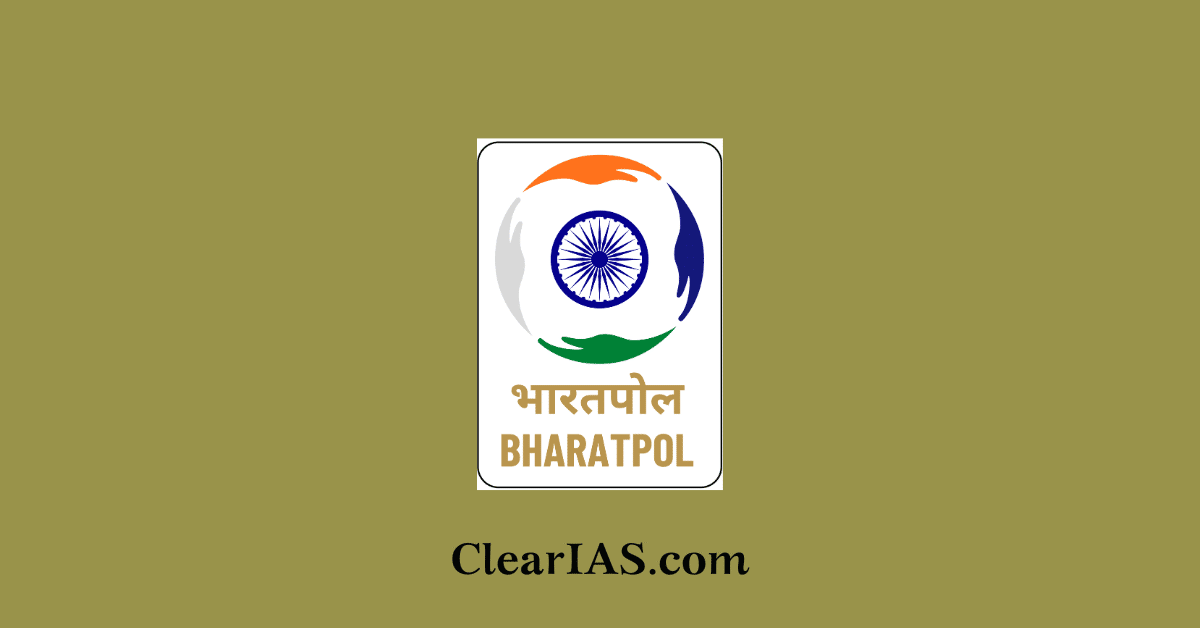
BHARATPOL Portal has been launched to Enhance Law Enforcement Collaboration both nationally and internationally. It represents an advancement in India’s law enforcement capabilities, international cooperation and crime control. Read here to learn more.
The Union Home Minister’s launch of the BHARATPOL portal represents a significant step in strengthening India’s capacity to address transnational crimes and enhance the efficiency of investigative agencies.
Key Features of the BHARATPOL Portal
- Developed by the CBI:
- Streamlined International Assistance:
- Enables quicker processing of Red Notices and other INTERPOL notices.
- Provides tools for field-level police officers to tackle crimes requiring international cooperation.
- ‘BHARATPOL’ will have access to 19 types of databases from INTERPOL, which will help analyze crimes, prevent them, and apprehend criminals
- Targeting Transnational Crimes:
- Focus areas include:
- Cybercrime
- Drug Trafficking
- Human Trafficking
- Other transnational offencesTransnational Organized Crime requiring coordinated international action.
- Capacity Building Initiatives:
- The CBI will train state police forces to utilize the portal effectively.
- Training will also cover the application of India’s new criminal laws, ensuring agencies are equipped for efficient trials and investigations.
- Focus areas include:
Significance of the BHARATPOL Portal
- Enhanced Investigative Capabilities: Facilitates faster and more streamlined information-sharing, crucial for tracking fugitives across borders.
- Strengthening Police Efficiency: Empowers field-level officers with access to international resources, enabling quicker responses to crimes with cross-border implications.
- Enhanced crime control: The introduction of ‘BHARATPOL’ and the implementation of provisions in India’s three new criminal laws aim to bolster the country’s ability to combat crime, apprehend fugitives, and address cross-border criminal activities effectively.
- Through the ‘Trial in Absentia’ provision in the three criminal laws, cases can be conducted in the absence of fugitives and award them sentences
- Combatting Rising Transnational Crimes: With an increase in cybercrime, drug trafficking, and human trafficking, the portal equips Indian agencies to tackle these challenges more effectively.
- Improved Coordination with INTERPOL: The portal ensures better utilization of INTERPOL’s tools, enhancing India’s global law enforcement collaboration.
Challenges and Future Outlook
- Adoption and Training: Ensuring that all state and central agencies are adequately trained to use the portal.
- Technological Integration: Aligning the portal with existing police and judicial systems for seamless operations.
- Global Collaboration: Strengthening India’s position as a reliable partner in international law enforcement through the effective use of BHARATPOL.
International Criminal Police Organization (INTERPOL)
Established: 1923
Headquarters: Lyon, France
Membership: 195 member countries
INTERPOL is the world’s largest international police organization, facilitating global cooperation among law enforcement agencies to combat transnational crime.
Key Features of INTERPOL:
- Objective: To enable police forces across the globe to collaborate effectively in preventing and investigating crimes that cross borders.
- Structure:
- General Assembly: The supreme governing body, meeting annually to discuss policies and strategies.
- Executive Committee: Oversees the implementation of decisions and strategies.
- Secretary-General: Leads the day-to-day operations.
- National Central Bureaus (NCBs): Operate in member countries, connecting them to INTERPOL’s global network.
- Core Functions:
- Global Databases: Maintain databases of fingerprints, DNA profiles, stolen property, and wanted persons.
- Notices System: Issue alerts such as:
- Red Notices: Requests for the location and arrest of wanted individuals.
- Blue Notices: Collect information about a person’s identity or activities.
- Yellow Notices: Assist in locating missing persons, often minors.
- Criminal Intelligence Sharing: Facilitate the exchange of crime-related intelligence among member countries.
- Operational Support: Provide field assistance during investigations and crisis situations.
Roles and Responsibilities
- Combating Transnational Crime: Address crimes such as terrorism, human trafficking, drug trafficking, cybercrime, and money laundering.
- Capacity Building: Train law enforcement officials in member states to enhance their skills in combating emerging criminal trends.
- Coordination during Emergencies: Support law enforcement responses during natural disasters, terrorist attacks, or major international events.
- Global Law Enforcement Tools: Provide advanced tools like I-24/7, a secure global police communications system, enabling real-time information exchange.
Significance
- Global Collaboration: Connects law enforcement agencies worldwide, facilitating unified action against international crime.
- Neutral and Non-Political Role: Operates based on neutrality, avoiding involvement in political, military, or religious matters.
- Enhanced Security: Strengthens global security by disrupting organized crime networks and facilitating the extradition of fugitives.
Challenges
- Abuse of Red Notices: Allegations of misuse by some countries to target political dissidents.
- Limited Enforcement Power: INTERPOL lacks the authority to arrest individuals; it depends on member states for enforcement.
- Funding Constraints: Relies on contributions from member countries, leading to resource limitations.
- Cybercrime Threats: Rapid technological advancements pose challenges in tackling sophisticated cybercrime networks.
India’s Engagement with INTERPOL
- Central Bureau of Investigation (CBI): Functions as India’s National Central Bureau (NCB) for INTERPOL.
- Collaboration: India actively participates in global crime-fighting initiatives and leverages INTERPOL tools for tracking fugitives and combating organized crime.
- Hosting INTERPOL Events: India hosted the 90th INTERPOL General Assembly in 2022, highlighting its active involvement in the organization.
Conclusion
The BHARATPOL portal reflects a modernized approach to tackling complex crimes in an interconnected world, enhancing India’s investigative capabilities and global cooperation efforts.
Frequently Asked Questions (FAQs)
Q. Which Indian agency works with Interpol?
Ans: The Central Bureau of Investigation (CBI) is the nodal body for the Interpol in the country.
Q. When did India join Interpol?
Ans: India joined Interpol in 1949, and has been an active member of the organisation. It has hosted two General Assemblies. Last year, India hosted the 90th General Assembly here which saw the participation of delegations from 168 countries.
Q. Which countries are not members of Interpol?
Ans: UN member states without membership
- North Korea
- Palau
- Tuvalu
Partially recognized states and entities without membership or sub-bureau status
- Abkhazia
- Northern Cyprus
- Sahrawi Arab Democratic Republic
- South Ossetia
- Sovereign Military Order of Malta
- Taiwan
- Kosovo
-Article by Swathi Satish






Leave a Reply